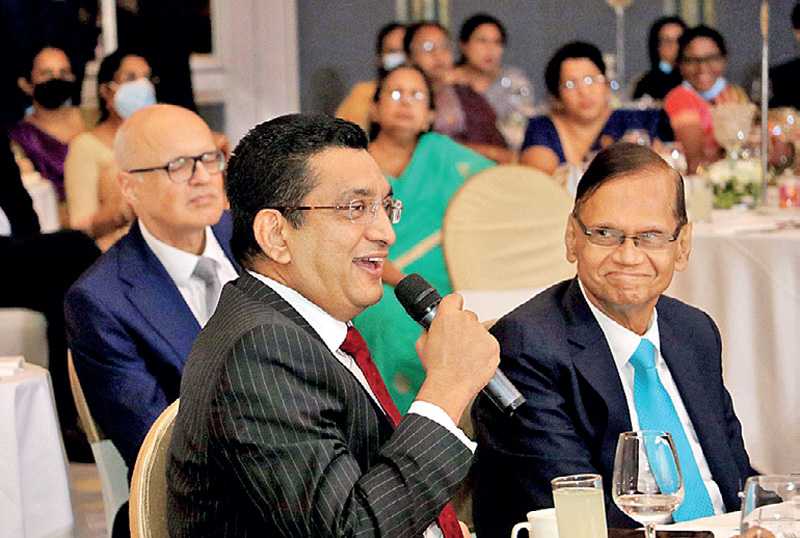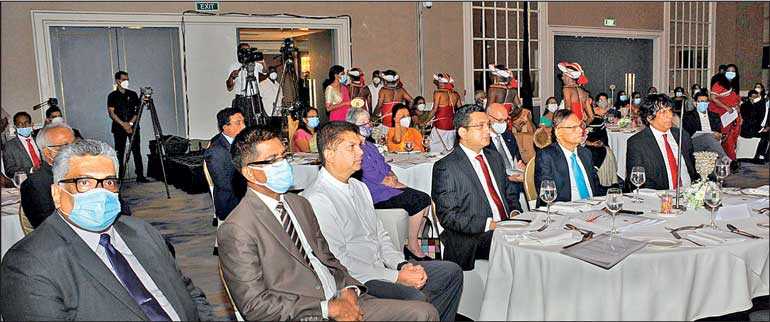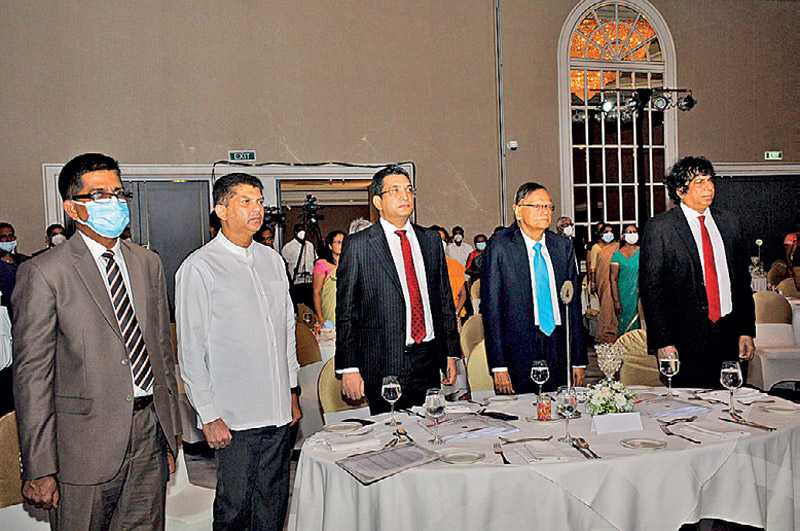Sunday Feb 15, 2026
Sunday Feb 15, 2026
Wednesday, 7 April 2021 00:00 - - {{hitsCtrl.values.hits}}

The Ministry of Justice hosted the International Development Partners Dialogue on 1 April at the Hilton Colombo.
The event was attended by heads and representatives of international organizations and missions including UNDP, UNICEF, UNFPA, KOICA, The Asia Foundation, IOM, JICA, ADB, ICRC, UNODC, USAID, The World Bank, IOM, The European Union, Switzerland, and Australia. The Chief Guest at the event was Minister of Education G.L. Peiris and he delivered the keynote address at the event. Prof. Peiris also spoke on amendments to be made in the Legislature which will be presented in Parliament within the next few months.
Attorney General Dappula De Livera and State Minister of Prison Management and Prisoners Rehabilitation Lohan Ratwatte, Secretary to the Ministry of Justice M.M.P.K. Mayadunne, and the heads of several State institutions were also in attendance.
The objective of the event was to set out in detail the justice reform programme of the Ministry of Justice to the said organisations along with the areas that require technical assistance, capacity building, and institutional development and also serve as a forum for the said organisation’s plan and to partner with the Ministry of Justice and Government in efficiently attaining the objectives of the justice sector reform drive.
Reforms and objectives
Opening remarks were made by Minister of Justice M.U.M. Ali Sabry, PC, who spoke on the need for reforms and the objectives sought to be achieved by the event and working together with the development partners on the prevailing shortcomings of the system which are currently identified by the visits made by the Minister himself in order to develop the infrastructure and standards of judicial system.
The Minister also stated: “I got two reports suggesting 10 reforms which will be rolled out within the next few months. And the other important thing is, when I was looking holistically at the entire process of how to improve our efficiency in the system. One thing we have not been able to do for a long time is to embrace technology. We are in the process of doing that and I am happy that we have come a long way in doing so and there are 21 institutions under the Ministry of Justice. Those institutions will be named in the future. All the traces need to be improved in processes reengineering, the uplifting of standard of institutions, individual training as well as capacity building,” which points to a prospective change in the judicial system.
A presentation on ‘Overall Legal and Policy Reforms’ was made by Shamir Zavahir, Attorney-at-law (Coordinating Secretary at the Ministry of Justice) followed by presentations on the specific areas by Thushara Suraweera (Addl. Secretary, Ministry of Justice), Navin Marapana, PC (Chief Legal Advisor – Sub-Committee on Digitisation and Court Automation), Kaushalya Navaratne, Attorney-at-law (Chief Legal Advisor – Sub-Committee on Commercial Law Reforms), H.M.T.N. Upuldeniya (Commissioner General of Prisons) and Harsha Fernando, Attorney-at-law (Consultant – ADB Bank).
The presentations were followed by a dialogue between the development partners and Ministry of Justice which included discussions on the mechanism to move forward and the efficient collaboration on projects.
Sabry says justice strengthened
In his speech Justice Minister Ali Sabry said justice had been strengthened in Sri Lanka.
“Today is a very special day for us in the Ministry of Justice. We have been working as a team. We are trying to find ways and means to improve the present process. The presentations will show where we stand at present and that we want holistic resolutions and not just adopting timely resolutions. We need to look at the overall sector specifically of each and every institution and the process. We have identified that there are ways to improve our sector.
“I thought that we have just 15 judges per one million people which is totally inadequate; we have come up to at least double the number of judges during the next few years. Last week we presented a road map for the next 15 months to improve the Judiciary by another 93 judges. In the meantime it is important that we roll out the legal reforms and a number of committees are looking at it.
“I got two reports suggesting 10 reforms which will be rolled out within the next few months. And the other important thing is, when I was looking holistically at the entire process of how to improve our efficiency in the system. One thing we have not been able to do for a long time is to embrace technology. We are in the process of doing that and I am happy that we have come a long way in doing so and there are 21 institutions under the Ministry of Justice. Those institutions will be named in the future. All the traces need to be improved in processes reengineering, the uplifting of standard of institutions, individual training as well as capacity building.
“When I discussed with different stakeholders on the perspectives, one thing I saw was there was a lack of coordination between all these institutions and the efforts which have been made. As a result of it things have been duplicated or not properly evaluated or there is no proper accountability to prove though we work very hard. So today the attempt is to bridge that gap in order to identify what areas need improvement, what areas we need efficiency, what areas we need expertise of foreign countries, and to match those things with our friends.
“These institutions which are our stakeholders and development partners in the Ministry have been helping us; ever since I have started working they have come up with their programmes but today’s event is to give them a picture of what we intend to do during one to three years and how they can pick the areas of interest and receive them. Therefore I make use of this opportunity to welcome the honourable Chief Guest and the rest of the distinguished guests and also our development partners and the members so we can work together to build a better tomorrow for Sri Lanka and the rest of the world.
“Why we need to do this, something I realised we could emphasise on is infrastructure development. In infrastructure development we see the physical development of building roads, highways, providing electricity, connecting the internet, and water is preserved and has to happen. We as a Government see the legal systems as the software like we upgrade ourselves. Unfortunately the upgrading of legal software in the country has long been neglected. It is a decent attempt to upgrade the whole of the legal system and legal infrastructure. Laws, processes, ultimate gain is for us to enact our performance with the world class performers in the region and in the world.
Embracing technology
“During the last 12 months also due to this pandemic we were forced to embrace technology. I must say I have the opportunity to share another online meeting with the ministers of law in the Commonwealth and several countries made their presentations. Some of the countries are small countries in different parts of the world and they have achieved so much in terms of technology, e-hearing, filing, video conferencing, case management, they were embracing and practicing; we also done so but not to the extent that we could have done or not to the extent others countries have done.
“Here it is a great opportunity to take a leaf out of those books and that is why we thought of the expertise of various institutions which have been working with us for a long time; it is time that we work together because at the moment of taking over the Ministry the one thing in my mind was no more surveys, no more facts and figures, because we have taken so much time on such stuff and nothing has happened.
“One of my senior President’s Counsels stated when I met him that ‘55 years ago when I took oaths the issue was laws delays, and 30 years ago when I took over the office again in the profession the issue was laws delays’. When I entered the profession 25 years ago the issue was laws delays, even today the issue is laws delays. We shouldn’t pass this to the next generation, we must find the way to get out from our comfort zones and meet these challenges. That’s the idea.
“I am sure if we work together, work hard, if we work as a team and we work with the aim I am sure we can achieve. So once again I make this opportunity to thank each and every one who has come here today. And I request all of you to go through this next presentation which will come with areas which you are comfortable with and express your desire or willingness to work. If you want further clarification, the Ministry of Justice has already set up a special unit for the first time, the Ministry’s Reforms Division headed by an Additional Secretary. The Reforms Division is looking at these law reforms, digitalisation, technological advancement, the advancement in terms of the upgrade in the standards of the institutions which are under our institute.
“I would like to remark how with enthusiasm, teamwork and institutional support we have achieved something we thought unachievable: When I took over in August we had 8,000 cases pending on the backlog, it took about six to nine months for the report to sum up and along with our secretary Mayadunne and a team of our educated officers from the Ministry we visited and carefully went through to find out what were the issues, then we saw there was a lack of capacity of staff; we encouraged them to work through shifts and work overtime. But some instruments which were short were sponsored by one of our partners and then I realised someone needs to carefully look at the place and monitor that and observe the performance and report it. So we carefully thought about it and appointed a retired Government analyst to the institution directly put into the Ministry. I am very happy to say that she comes and reports that 8,000 reports have been cleared; now they are looking at the cases we are handling and rolled out to manage the cases within one month’s time which used to be around six to nine months just a few months ago. So it is possible, nothing is impossible and I am sure we will come around drastically and you will be partners of the journey and be proud wherever you are when those plans will come out handy in few years. Once again thank you everyone for being present here and those who are involved in this event.”
Prof. Peiris lauds approach
Prof. Peiris in his speech said: “I don’t think that there has ever been a time where the Government of Sri Lanka has allowed so many initiatives at the same time. We are today involved in the exercise of constitutional reforms, revisiting and critically evaluating the existing law. The people of the country must have confidence that justice will be delivered effectively and expeditious by the Court system, that is a very irreducible condition of functioning democracy. I thank the Minister of Justice, who is a leader and practitioner enjoying the esteem of his peers, which I think is very important.
“About 60% of the Legislature will be amended and debated in the upcoming months. It covers the entire spectrum, judicial infrastructure, coordination, civil pluriform and criminal pluriform, and commercial pluriform and a whole range of legislation in each of these steps is going to be presented in the parliament within the next few months. Donor institutions were the right choice as it is not an unrealistic expectation but a well-founded expectation that this country has an institutional strength so fortunate and get to our destination.”

